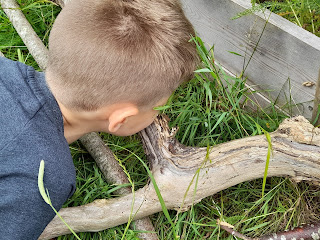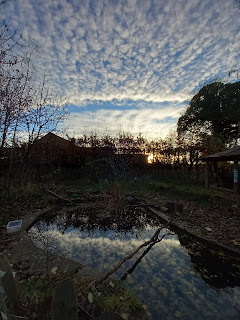Forest School and GCSEs
Earlier in the year, I wondered aloud - well, in print - why Forest School isn't automatically offered as an add-on to teacher training. I know of a few universities that organise visits to sessions, and even one or two that buy in extra training and regularly send the students to a session to participate, not just observe, but it isn't standard practice.
Whether Covid is on the rise, mutating again, or slowly dying out, in this post-lockdown world getting children outside as much as possible is the healthiest option! Outdoor learning has proven time and again that it promotes well-being and increases positive mental health, as well as promoting physical health. With the new GCSE in Natural History on the horizon Secondary Schools may well find embracing Forest School an easy way to introduce the subject.
Of course, Forest School is not yet embedded in all Primary Schools, those that have it may well find their pupils at an advantage when choosing such a GCSE a few years after leaving. Many Secondary Schools struggle for space as it is, and all schools find it hard to squeeze any time into the curriculum. Hopefully, independent Forest School Leaders will be able to step up and offer places for years 10 & 11 to travel to once they start their studies.
As part of the Government strategy for sustainabiliy and climate change, the GCSE is intended to cover many aspects of British Natural History alongside a more global understanding. It would be very ineffective for most of this to be in theory only, there needs to be a lot of hands-on, in-the-field, practical experience to make the information more meaningful. We have no idea what world today's teenagers will face in their 30s and 40s. The prospect ranges from bleak to hopeful, with a lot of it dependent on us right now, and even more of it hinged on what they do in the future.
There is a very good chance that my current Year 6 cohort will be offered a GCSE in Natural History, so what we do today in Forest School is setting the foundations for that. Although I have no set curriculum of knowledge to impart, the children do cover a progression of skills as they move through school from eyfs to KS2. They do get to experience seasons and weather. They may not have a tick chart or worksheet, but they can categorise many creatures from a woodlouse to a wood mouse! They understand many life cycles and food chains, frequently without realising! They are building a bond with the great outdoors. Even those who say they prefer their computer would be unhappy to miss their sessions!
Today I had a coffee with a group of neighbours, one of whom is a Team Building Coach who works with corporations. While discussing Forest School (my job always requires explanation!) we found a huge amount of common ground! We agreed that identifying wildlife could happen via powerpoint, and that life cycles and food chains were covered in books, but we failed to see how we could equal the non-academic outcomes. The resilience, the self-esteem, the self-motivation, and the independence is difficult to replicate as effectively. The difficulty our education system has in building teamwork, cooperation, communication, and invention is something she is trying to add into workforces decades after they leave school!
Forest School has the unique position of offering a pedagogy that improves listening, observing, engagement, and attitude, while layering an intrinsic understanding of the world children live in, in an environment that promotes health and wellbeing.
It fits perfectly in a joined-up delivery of meaningful teaching and learning for the future, and it's a starting point that we need to use to help the changes pending in education, and global issues brewing in the 21st Century.
The practical side of delivering any Outdoor Learning regularly is going to be the biggest challenge for delivering the GCSE.We have space to run at least four FS sessions on site without intruding on each others space, which presents the theory that another school could be using part of our site without impacting our own timetable. With extra staff trained we could offer to lead sessions... tailored to whatever the syllabus requires.
It's something we have started to consider. Hopefully, other Schools which do have Forest School will reach out to those who don't. No one solution will fit all, but the sooner there are options up and running the better.
There will obviously be a lot more to the new GCSE than just sessions with a Forest School Leader. But, if nothing else, it will reinforce all the attributes that are apparently missing in the workplace regardless of which exams the pupils are studying for.
Whatever the intention it's a good starting point.
Universities and colleges need to start thinking about how they are going to prepare student teachers to deliver this new syllabus, and they need to future-proof the training they are offering to include more experience of teaching outdoors.
If you run any kind of Forest School, now is the time to start thinking if and how you can assist!
Because you know those who have finally, and rightly, decided to place climate & sustainability in the curriculum, will have chosen what needs to be covered, but will have no suggestions as to how!
And if you you are involved in teacher training in any way, now is the time to seek out places with Outdoor Learning and Forest School embedded in their school.











Thanks for sharing this blog with us. Really informative content.
ReplyDeleteAt the early learning centre Enderley we provide a Reggio inspired programme that enables the children to learn through exploration, inquiry and discovery of the outside world using the environment as the third teacher.
The education system needs to understand Forest School a lot better. It supports in class learning by NOT being lessons outside and teaching skills. This is needed in secondary school too. Especially if it was missed in Primary!
ReplyDelete